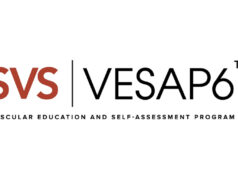
PALM BEACH, Fla.— The more open aortic repair (OAR) case volume vascular surgeons take on, the more it seems to be “impactful” on OAR outcomes than a physician’s accumulated years of practice experience.
The finding was revealed by Salvatore T. Scali, MD, a vascular surgeon of the University of Florida, Gainesville, Florida, and colleagues in a scientific session at the Southern Association for Vascular Surgery (SAVS) annual meeting (Jan. 8–11) down the state’s Atlantic coast in Palm Beach.
Scali et al had been keen to explore—as the title of their SAVS presentation outlines—“The intricate association between case volume and years of practice experience on open AAA [abdominal aortic aneurysm] repair.”
The backdrop is a familiar one: the widespread adoption of endovascular aneurysm repair (EVAR) having led to a decline in OAR. This has impacted both vascular surgery trainees and experienced practitioners alike, Scali pointed out.
“While the volume-outcome relationship has been studied extensively,” he told SAVS, “little remains known about the complex interaction of surgeon experience versus case volume on patient selection, procedural characteristics and postoperative complications associated with OAR.”
The researchers dipped into the Society for Vascular Surgery (SVS) Vascular Quality Initiative (VQI) for all infrarenal OARs (n=11,900) from 2003– 2019. Of them, 71.4% were elective, with the balance nonelective.
Surgeon experience was defined as years in practice after training, with the level categorized chronologically. They were ≤5 (n=1,667), 6–10 (n=1,887), 11–15 (n=1,806) and ≥16 (n=6,540) years, respectively. Annual case volume, meanwhile, was set as the number of OARs performed by a surgeon during a year, with a median of five.
Years in practice had little effect on adjusted mortality for elective and nonelective procedures (30-day death: elective p=0.2; nonelective p=0.3). For one year, the results were similar (elective p=0.2; nonelective p=0.2). The authors did note, however, that more experienced surgeons had few complications after elective open repair. The rate for ≥16 years of experience was 25% vs. 29% for those with ≤5 (p=0.004).
On the other hand, when surgeons were stratified by case volume and years in practice, those carrying out more than five case per year had consistently lower mortality and complication rates.
“Increasing surgeon experience was significantly associated with performing a greater proportion of elective procedures,” Scali said. The statistics produced flesh out the point: for elective, 73% ≥16 years vs. 62% for ≤5 (p<0.0001); for nonelective, 38% ≤5 years vs. 27% for ≥16 years (p=0.0001).”
Perhaps most interesting of all: “Notably,” Scali et al said, “high-volume, early-career surgeons had outcomes similar to older, low-volume surgeons.”
Concluding, the investigators said: “To assure optimal OAR outcomes nationally, early practice designation, mentorship strategies for onboarding early-career surgeons and low-volume aortic surgeons should be considered.”
Recalling his days as a fellow, Kenneth J. Cherry Jr., MD, of the University of Virginia in Charlottesville, Virginia, the presentation’s designated discussant, posed an intriguing conundrum by way of observation.
“There was a vascular surgeon in California who routinely and continuously sent [my mentor] the worst-known cases you can imagine,” he explained. “Later in the year, I asked, ‘Does it surprise you that this person who has been practicing vascular surgery all these years, continues to do this?’ And he looked at me like I had bricks for brains, and said, ‘No, it doesn’t surprise me at all.’ Twenty years of experience is vastly different than one year’s experience 20 times.
“What that brings to mind is that I don’t know that there’s any other thing you can look at except years of practice, but it doesn’t really tell us if someone is clinically astute or technically excellent.”











